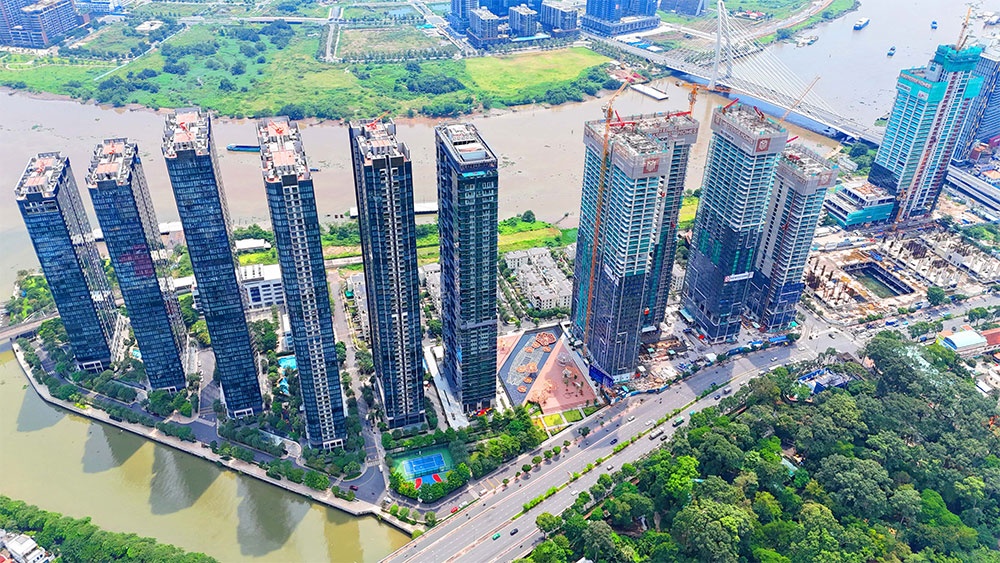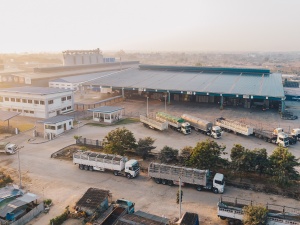Another push for real estate bounce
 |
| Expanded access to affordable social housing has been one among many aspects addressed this year by leaders, photo Le Toan |
Prime Minister Pham Minh Chinh last week issued a dispatch on sweeping reform aimed at revitalising the country’s real estate sector. The directive is a part of a series of measures designed to encourage a safe and robust property market, which is integral to Vietnam’s broader socioeconomic objectives.
The government’s stance recognises past efforts and existing challenges in the real estate sector.
“We have seen positive shifts, particularly with the reduction of interest rates and real estate lending,” remarked the PM. “However, there is an urgent need to tackle persisting issues surrounding legalities, land allocation, pricing, and administrative processes.”
Specifically, the PM has directed the State Bank of Vietnam (SBV) to guide commercial banks in bolstering real estate credit lines, simplifying lending processes, and possibly reducing interest rates.
“By facilitating smoother credit access for both developers and buyers, we anticipate a more dynamic market and a spur in overall growth,” explained PM Chinh.
Under the new directive, the SBV and the Ministry of Construction (MoC) are collaborating to refine the credit programme for social housing, aiming to expedite project approvals and funding disbursements.
Elsewhere, in last week’s report from the MoC, a striking increase in credit towards real estate businesses in Vietnam has emerged. By August 31, the sector’s outstanding loans soared to approximately $41.6 billion, a rise of 23.3 per cent since late 2022.
Financial statements for Q3 reveal a robust growth in corporate real estate lending across major banks, while personal home loans show sluggish expansion.
At VPBank, loans for real estate businesses jumped by 45 per cent to about $4.14 billion, representing 18.83 per cent of its total lending. In contrast, VPBank’s personal loans for housing grew by just 6.6 per cent.
Techcombank also saw a significant rise in real estate business lending, which increased by 47.2 per cent and accounted for 34.63 per cent of its total credit balance. Personal loans at the bank, however, dropped by 9.2 per cent.
MSB mirrored this trend, with a 20 per cent hike in real estate business lending against a modest 5.8 per cent increase in personal loans.
Hanoi Party Committee Secretary Dinh Tien Dung last week also identified critical challenges in credit access and proposed solutions to boost the real estate sector. He focused on the disparity between bank liquidity and the financial needs of businesses.
“Banks have excess liquidity, but businesses are starved of cash, making access to capital challenging. Resolving this credit imbalance is crucial for revitalising production and stimulating the stagnant real estate sector,” Dung said.
He also highlighted that over 700 real estate projects in Hanoi have been delayed, some for up to 20 years, causing public unrest and impacting urban security.
The city’s response, involving the reclamation of thousands of hectares from over 100 projects for auction and tender, aims to kickstart development and restore public trust.
Michael Kokalari, economist at VinaCapital, believes that Vietnam’s housing sector is grappling with a significant mismatch: the burgeoning middle class’s need for affordable homes is rising, but the production of new housing units remains critically low. “Central to this impasse is the nation’s cumbersome zoning and approval processes. These procedures have become increasingly mired in complex government dynamics, hindering the development of more residential buildings,” Kokalari said.
Furthermore, the financing challenges for land acquisition and construction have notably slowed project developments.
“Previously high interest rates in Vietnam rendered project financing costly for developers. Compounded by difficulties in obtaining necessary government zoning and approvals, securing loans became near impossible, as banks are wary of funding projects without official sanction,” he added.
“We note that there have been some recently intensified efforts within the government to remove and reduce the obstacles developers have been facing in attaining the approvals needed to proceed with certain specific projects,” Kokalari stated.
While there is an undeniable link between property development and national economic health, the real estate sector contributes modestly to the country’s GDP, Kokalari explained.
“Consequently, the slowdown in this sector is not the principal driver of Vietnam’s GDP growth dip this year, especially considering the sector’s already sluggish pace last year,” he added. “Moreover, Vietnam’s experience contrasts with China’s, where real estate holds a far more significant share of the economy and exerts a more profound influence on national GDP growth.”
| Trang Bui, Country head Cushman & Wakefield Vietnam
With PM Pham Minh Chinh signing a dispatch on developing real estate, removing obstacles regarding legal matters and capital access, reducing lending interest rates, there will be positive effects when these policies are fully implemented. The market started to grow in 2018 and then declined in liquidity due to credit limitations. This year has been difficult for the global economy. Decisions of domestic, foreign, and individual investors have been affected. Therefore, if there is a reasonable measure to make a pathway for capital flows, which can help reduce credit pressure, it will be great news for the real estate market. In theory, we see the dispatch can be a driver for growth. The amount of credit entering the market has been strictly controlled in recent years. Although we are still in the early stages of recovery, we hope the market can maintain stable and sustainable growth rather than going through sudden changes, leading to bubbles like the previous cycle. Instead of applying these policies to all subjects at the same time, we should apply them on a case-by-case basis. We should also look into similar case studies worldwide. If investors are operating effectively, there is no reason why they cannot continue to lend. On the contrary, investors who have large debts and a high a financial leverage ratio must consider reducing their lending levels. We think it will be more effective if these solutions are applied flexibly to each case, rather than applied to all objects in the market. The advice that we want to give to investors in the real estate market as well as individuals who are planning to buy is to be clearly aware of their financial capabilities and to make sure that they have the ability to repay loans and avoid betting on the premise that the market will improve or grow continuously. What we learn from past lessons is that the real estate cycle in Vietnam is shorter than in other markets with sustainable development. The cycle here can be several years, but we need to be cautious when we decide to borrow to invest. Vo Hong Thang, Director of Market Services and Project Development, DKRA Group
Recent decisions on removing obstacles in implementing land management and use, land allocation, and land valuation, as well as on developing real estate in general, clearly demonstrate the government’s concern in its efforts to help revive the market, creating a foundation for it to gradually recover and make steady progress in the long term. In fact, the standards and regulations are already in place and banks are closely implementing and strictly complying with the above regulations in carrying out their assigned responsibilities. Some banks are hesitant in accelerating loan disbursement for the sector. The caution in banks is reasonable. Accordingly, only projects that are fully legal and eligible for loans are allowed to access credit. On the contrary, this likely greatly affect national monetary security as well as affecting the legitimate interests of project buyers, especially projects formed in the future if the approval is inconsistent. However, it cannot be denied that some procedures for loan approval by banks are cumbersome, with limitations that waste a lot of time. If we can shorten the approval process for projects with full legality and real estate credit, there will likely be improvements in the near future. From a business perspective, to flexibly adapt, real estate companies need to grasp market opportunities under the new conditions. A number of strategies can be considered, such as, enhancing operational efficiency through optimisation of cost structure, operating costs, and streamlining human resources. Other measures are utilising the interest rates which are on a downward trend, restructuring business loans and payables, diversifying capital mobilisation channels, calling for capital from foreign investment funds, and flexibly applying quick payment discount policies. Finally, it is key to prioritise developing of strategic projects with completed legal documents instead of spreading investments and rolling out many projects at the same time. |
 | Land space shake-up mooted for tourism The legal inclusion of tourism projects in the list of land that can be repossessed by the state and assigned to investors for socioeconomic development was among the key issues experts discussed at a seminar organised by VIR last week in Hanoi. |
 | Industrial real estate witnesses robust growth in Q3 Vietnam's industrial real estate sector has shown remarkable signs of growth in the third quarter of 2023, with substantial new project launches contributing significantly to the market. |
 | Foreign investors show keen interest in Vietnam's real estate A recent survey by the Vietnam Real Estate Research Institute reveals robust international interest, with calls for better legal and regulatory frameworks to fully capitalise on this growing investment trend. |
What the stars mean:
★ Poor ★ ★ Promising ★★★ Good ★★★★ Very good ★★★★★ Exceptional
Related Contents
Latest News
More News
- Construction firms poised for growth on public investment and capital market support (February 11, 2026 | 11:38)
- Mitsubishi acquires Thuan An 1 residential development from PDR (February 09, 2026 | 08:00)
- Frasers Property and GELEX Infrastructure propose new joint venture (February 07, 2026 | 15:00)
- Sun Group led consortium selected as investor for new urban area (February 06, 2026 | 15:20)
- Vietnam breaks into Top 10 countries and regions for LEED outside the US (February 05, 2026 | 17:56)
- Fairmont opens first Vietnam property in Hanoi (February 04, 2026 | 16:09)
- Real estate investment trusts pivotal for long-term success (February 02, 2026 | 11:09)
- Dong Nai experiences shifting expectations and new industrial cycle (January 28, 2026 | 09:00)
- An Phat 5 Industrial Park targets ESG-driven investors in Hai Phong (January 26, 2026 | 08:30)
- Decree opens incentives for green urban development (January 24, 2026 | 11:18)



 Tag:
Tag:




















 Mobile Version
Mobile Version